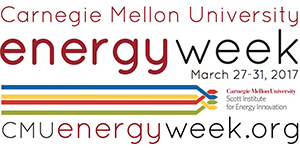Contesting Energy: Labor, Culture and Politics

In the world of energy innovation, there is a place for the humanities, and a team of Carnegie Mellon University historians and literary and culture experts are about to show why.
The English Department’s Kathy M. Newman, Jacob Goessling and James Wynn and the History Department’s John Soluri will present “Contesting Energy: Labor, Culture and Politics” as part of the Scott Institute’s Energy Week, March 27-31. The symposium will focus on the role that energy plays in culture at large, and more specifically in the Pennsylvania region.
“The humanities are always having to justify their existence, and here’s one way the humanities can directly contribute to a significant problem in the world,” said Goessling, a Ph.D. student in literary and cultural studies.
The issue of renewable energy involves the humanities in terms of how people see energy in their surroundings. The existence of wind farms, for example, can conflict with the ways people have come to think about the beauty of uninterrupted landscapes, especially in American culture.
“People are starting to consider how changes in energy technologies will be coupled with changes in culture,” Goessling said.
In this case, the humanities provide tools to develop new ways of seeing the energy forms that surround us.
“I decided to get involved with the energy symposium to highlight the important role that social and political forces and argument play in energy policy and decision making,” said Wynn, associate professor of English and rhetoric. “At the conference, I’ll be talking about citizen science in the wake of the nuclear meltdown at Fukushima and how citizen efforts to gather and represent radiation risk generated controversy and raised questions about the quantity and quality of information the Japanese government was releasing in the wake of the accident.”
Their talk, sponsored by a seed grant from the Scott Institute, will touch on this and other topics, including energy in history, citizen science and the risk of energy production and petroleum work in the Americas. It will even cover Hollywood’s local, global and racial implications in movies like “Gasland” and “Promised Land,” both based in Pennsylvania. Columbia University’s Timothy Mitchell is the featured keynote speaker with his talk “The Energy for Democracy.”
Goessling believes their symposium is the start of something bigger.
“The primary goal of this event it to build connections among energy-minded humanities scholars, and to create a community that can interact and learn from each other,” he said.
CMU’s Dietrich College of Humanities and Social Sciences is well known for combining the humanities and social sciences to solve real-world problems. For example, philosophers are working to improve medical ethics practices and food marketing tactics geared towards children; historians are developing policy recommendations for forensic DNA profiling and drug policy; and, an English professor created a social networking tool to improve education, and it is now being used by tens of thousands of students all over the world.
--
by Stefanie Johndrow